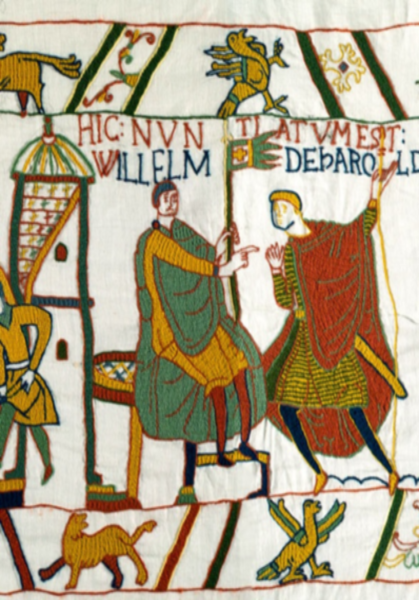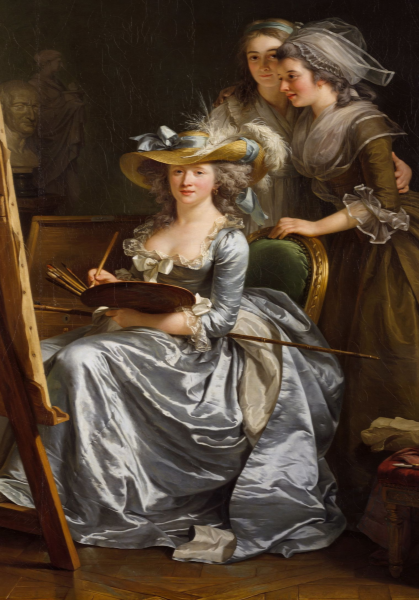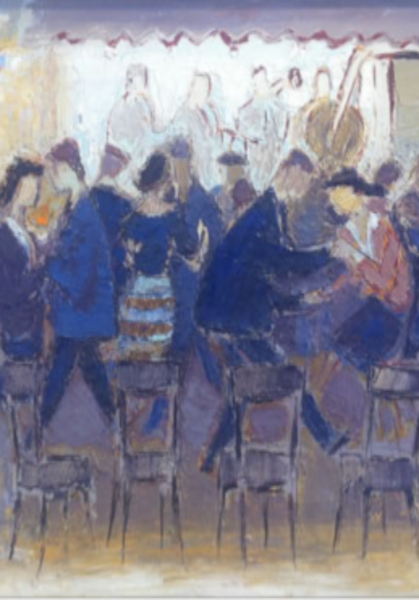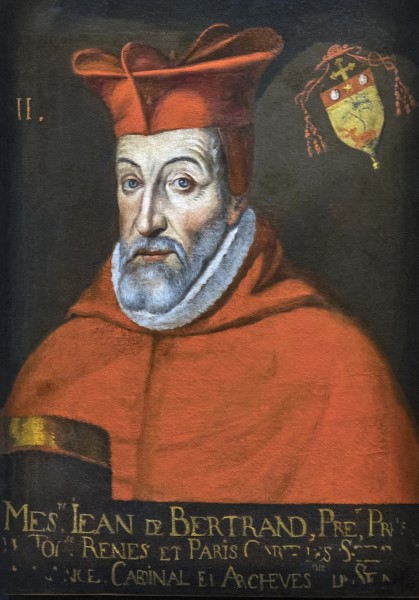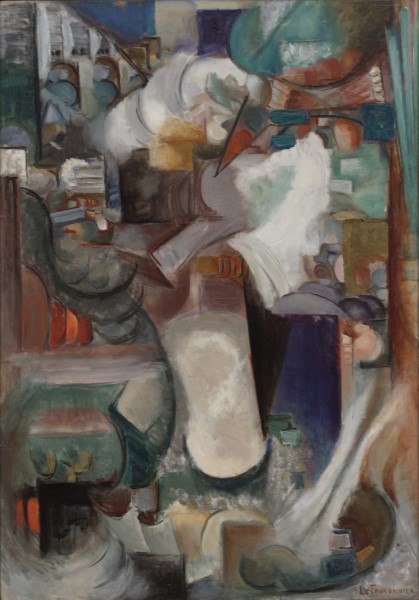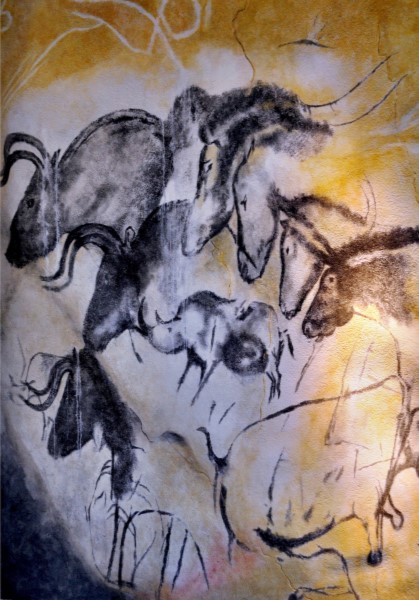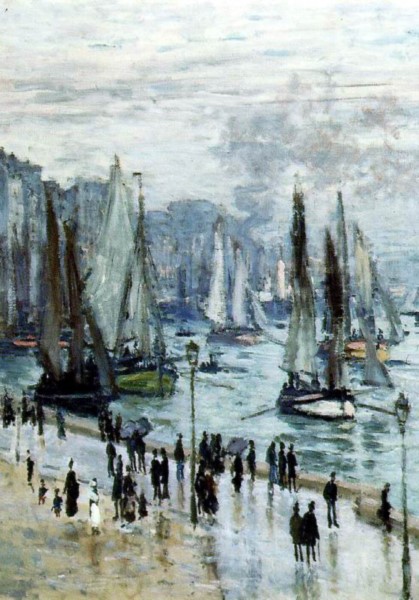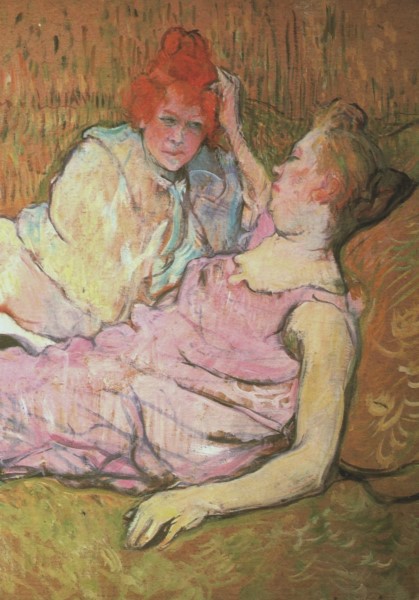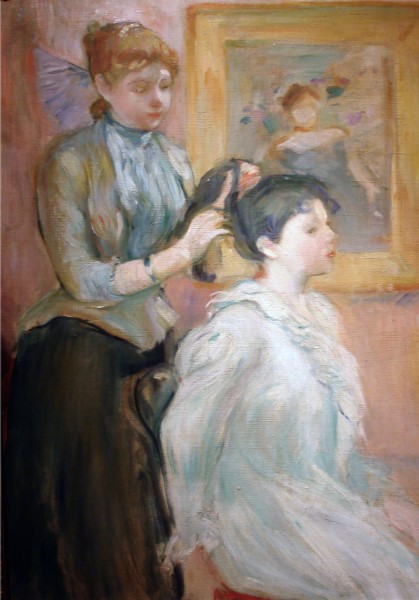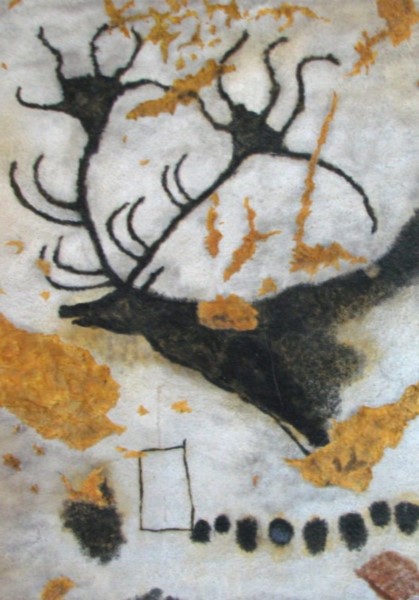Originating in 2009, H-France Salon is an interactive journal that welcomes proposals which will enhance the scholarly study of French history and culture. The following are the special issues that have been a part of the Salon.
Volume 15, Issue 10
“Dividing up the Past: Thinking about Periodization in Medieval and Early Modern Francophone History”
Edited by:
Christine Adams, St. Mary’s College of Maryland
Charles-Louis Morand-Métivier, University of Vermont
For scholars who study the eras traditionally classified as medieval and early modern, concerns around periodization—how we divide and label the past—are particularly complicated and fraught. Periodization is deeply ingrained in academic life, but traditional divisions are problematic, obscuring as much as they reveal. While current modes of periodization lie in the history of history, interdisciplinarity and the widening of the historical and regional lens have implications for how we think about the slicing up of our historical past. The editors for this special issue, Christine Adams (Department of History, St. Mary’s College of Maryland) and Charles-Louis Morand-Métivier (Department of Romance Languages and Culture, University of Vermont) invited a diverse group of medieval and early modern scholars to discuss the ways in which these concerns about periodization affect their own work. This salon reflects the fruits of that exchange. These nine essays challenge us to reconsider traditional modes of periodization and to play with the boundaries—temporal and geographical—that shape our understanding of the past.
“Introduction to H-France Salon on Dividing up the Past: Thinking about Periodization in Medieval and Early Modern Francophone History”
Christine Adams (St. Mary’s College of Maryland) and Charles-Louis Morand-Métivier (University of Vermont)
“Periodization and Publication in Premodern French History”
Kathryn A. Edwards
University of South Carolina
“La périodisation en histoire : une problématique modernité”
Éloïse Adde
Central European University, Vienna
“Entre Moyen Âge et époque moderne : pesanteur et ´épaisseur des différents « temps » historiques”
Indravati Félicité
Université de La Réunion
“Reflections on Periodization: the case for late medieval French literature”
Tracy Adams
University of Auckland
“Marco Polo and the Courte-Durée Global Middle Ages”
Sharon Kinoshita
University of California, Santa Cruz
“The Great Reversal: Fast Geology and Slow Humanities”
Phillip John Usher
New York University
“Western(ish): Periods and Maps”
Anna Klosowska
Miami University
“Entities out of Time”
Daniel Lord Smail
Harvard University
Volume 14, Issue 22
“Colbert, Venality, and Parisian Judicial Elites during the Long Seventeenth Century: A Reappraisal by Robert Descimon”
Edited by Hilary J. Bernstein, University of California, Santa Barbara
Venality of office was one of the most characteristic peculiarities of the French monarchy in the early modern period, influencing not only the structures of royal governance and finance at all levels and the professional outlook of royal officials but also the ways that elite families constructed their identities, arranged their marriages, and disposed of their property. In a recent article, entitled “Colbert, la dette publique et la haute robe parisienne,” Robert Descimon delves into these issues, providing a forceful analysis of the ways that Jean-Baptiste Colbert attempted to harness the financial resources inherent in venal office holding among elite Parisian families, leading to an unintended decline in the market and profound shifts within Parisian robe families and the Parisian sovereign courts by the eighteenth century. This H-France Salon issue attempts to bring the conversation on these issues further and to relate them to debates that have taken place over the last generation among French historians: after (1) an introduction authored by Hilary Bernstein, it includes (2) a link to the article in question: “Colbert, la dette publique et la haute robe parisienne,” Bulletin de la Société d’Histoire de France (2015): 3-68 (actually appeared in 2019) https://www.jstor.org/stable/45238347; (3) the recording of a Zoom seminar held on these issues on Friday, 27 May 2022; (4) a written response to the questions raised in the seminar by Robert Descimon, directeur d’études emeritus at the École des Hautes Études en Sciences Sociales; and (5) a short bibliography for further reading.
“Introduction to ‘Colbert, Venality, and Parisian Judicial Elites during the Long Seventeenth Century: A Reappraisal by Robert Descimon’”
Hilary J. Bernstein
University of California, Santa Barbara
“Zoom Seminar on the work of Robert Descimon”
Moderated by: Hilary J. Bernstein, University of California, Santa Barbara
Recorded by: Jennifer Meissner, University of California, Santa Barbara
This Zoom seminar focused on Robert Descimon’s article, “Colbert, la dette publique et la haute robe parisienne,” took place on Friday, 27 May 2022. The seminar begins with a round-table discussion among four senior scholars, including Professor James Collins (Georgetown University); Professor Sarah Hanley, emerita (University of Iowa); Professor Jacob Soll (University of Southern California); and Professor Juliann Swann (Birbeck College, University of London) and then proceeds with a more general discussion among the participants.
“Pourquoi avoir fait lire « Colbert, la dette publique et la haute robe parisienne » ?”
Robert Descimon
École des Hautes Études en Sciences Sociales
Volume 14, Issue 21
“Maruao, les ailes de l’infini – Poèmes et essais bilingues de Flora Aurima Devatine et essais sur son œuvre (Maruao, the Wings of Infinity)”
Flora Aurima Devatine
Edited by Estelle Castro-Koshy, James Cook University

Co-édition entre les éditions Littéramā’ohi et H-France Salon, ce numéro spécial inclut la majeure partie de l’ouvrage Maruao, les ailes de l’infini – Poèmes et essais bilingues de Flora Aurima Devatine et essais sur son œuvre (Maruao, the Wings of Infinity) (dir. Estelle Castro-Koshy) publié par Littéramā’ohi (Papeete, 2022). Il comprend en première partie un recueil de poèmes en français, en anglais et en tahitien de Flora Aurima Devatine, suivi d’essais de cette grande poétesse et penseuse tahitienne contemporaine traduits en anglais. Le seconde partie constitue un recueil d’articles novateurs de chercheurs, enseignants et traducteurs sur son œuvre magistrale. Des poèmes fondateurs et inédits de Aurima Devatine, écrits sur une période de quatre décennies, sont accompagnés d’illustrations réalisées par des artistes autochtones de Polynésie française (Hihirau Vaitoare, Tokainiua Devatine et Viri Taimana) et quatre petits-enfants de l’auteure. L’article de Marie Lamothe est accompagné de vidéos de ses interprétations en langue des signes française de trois poèmes de la poétesse.
Les articles proposent pour la première fois des études de ses poèmes en tahitien (Turiano-Reea et Frogier Leocadie), de l’influence des écrivains hispaniques sur sa poésie (Tilly), de la manière dont ses poèmes résonnent avec la culture Sourde (Lamothe), du rôle des points d’exclamation dans son œuvre (Anderson et Guerre). Le génie et la richesse de l’œuvre sont mis en lumière à travers des analyses du rythme et du va-et-vient entre le tahitien et le français (Porcher), des défis posés par la traduction de son œuvre (Anderson, Lamothe), de l’enrichissement sémantique et de l’éveil des consciences qu’apporte celle-ci (Guerre), de l’invitation que l’écrivaine nous lance d’écrire et d’offrir « une main avec laquelle apprendre à tresser avec les autres » (Lehartel), de la poétique de la délicatesse et du quotidien dans son œuvre ainsi que de sa dimension anticoloniale (Castro-Koshy)1.
_______
1 La version intégrale-livre de Maruao, les ailes de l’infini / Maruao, the Wings of Infinity, publiée par Littéramā’ohi comprend les essais en français de l’auteure, six hommages à la poétesse, ainsi que la version originale ou traduite en français des articles inclus ici en anglais.
“Préface – Sur les ailes de l’infini : poétique du quotidien et de la délicatesse chez Flora Aurima Devatine”
Estelle Castro-Koshy
James Cook University
“Poèmes”
Flora Aurima Devatine
“Essays”
Flora Aurima Devatine
“Flora Aurima Devatine: The written word as transmitter of Tahitian traditions”
Goenda Turiano-Reea
Université de la Polynésie française
“L’enfant polynésien est sacré”
Tehea Karine Frogier Leocadie
Université de la Polynésie française
“Flora Aurima Devatine, la batteuse de mots”
Titaua Porcher
Université de la Polynésie française
“Le temps et l’espace d’écrire dans Tergiversations et Rêveries de l’Écriture Orale, Te Pahu a Hono’ura”
Temiti Lehartel
Université de Montpellier III and the Royal Melbourne Institute of Technology
“Simple Complexity, Complex Simplicity: on Translating Flora Aurima Devatine”
Jean Anderson
Victoria University of Wellington
“Translating a linear language into three dimensions”
Marie Lamothe
“Hispanic Influences in the Work of Flora Aurima Devatine”
Eva Tilly
Université Rennes 2
“Postface: Inventing the Vocative”
Philippe Guerre
“Video : Flora Aurima Devatine: poems ‘Le pétrel’, ‘Solitude’ and ‘Adresse’”
Adaptés en langue des signes par Marie Lamothe
Volume 14, Issue 8
“Rethinking Race and Representation in Art History and Material Culture of the Eighteenth- and Nineteenth-Century Francosphere”
Edited by:
Gülru Çakmak, University of Massachusetts Amherst
Jennifer Ngaire Heuer, University of Massachusetts Amherst
n the wake of widespread calls to decolonize institutional narratives of cultural heritage, the editors for this special issue, Gülru Çakmak (Department of the History of Art and Architecture, University of Massachusetts Amherst) and Jennifer Heuer (Department of History, University of Massachusetts Amherst), invited articles that would rethink constructions of race in art history and material culture in the eighteenth- and nineteenth-century Francosphere. The pieces gathered here—eight articles, two poems and an interview—collectively examine art historical and historical narratives that reproduce racialized and imperialist ways of seeing and organizing the world and the past. By the same token, they offer alternative pathways to reclaiming historical agency as well as reflecting on the economic and commercial aspects of representing race and colonialism.
“Introduction to Rethinking Race and Representation in Art History and Material Culture of the Eighteenth-and Nineteenth-Century Francosphere”
Jennifer Ngaire Heuer (University of Massachusetts Amherst) and Gülru Çakmak (University of Massachusetts Amherst)
“Discriminating Taste: Skin Color and Connoisseurship in Eighteenth-Century France”
Oliver Wunsch
Boston College
“Le Chevalier de Saint-Georges and His Mother: An Epic”
Florence Ladd
“An Interview with Florence Ladd”
Gülru Çakmak
University of Massachusetts Amherst
Video HERE
“‘All the Devils are Here’: How the Visual Culture of the Haitian Revolution Misrepresents Black Suffering and Death”
Marlene L. Daut
University of Virginia
“Setting the Tone: Commodified Black Children and Slave Imagery in the Eighteenth- and Nineteenth-Century French Fashion Press”
Lise Schreier
Fordham University
“If Objects Could Speak: Tales of Race and Empire at Renoir’s Luncheon of the Boating Party”
Elizabeth Heath
Baruch College, City University of New York
“Where is the Orientalist Artist? On Gérôme’s 1887 Carpet Merchant”
Marc Gotlieb
Clark Art Institute and Williams College
“Searching for ‘la petite Sap’: Embodiment, Agency, and Recovery in Auguste Rodin’s Drawings of the Cambodian Royal Ballet”
Juliet Bellow
American University
“The Case of Dr. Maclaud in Coastal Guinea: Re-Assessing Colonial Photography”
Angie Epifano
Yale University
“Introduction: French Revolution, Empire, and Entangled Histories”
Jennifer Ngaire Heuer
University of Massachusetts Amherst
Volume 13, Issue 19
“Global History, Imperialisms, and the French Revolution”
Edited by Jennifer Ngaire Heuer, University of Massachusetts Amherst
This H-France Salon began as a series of responses to a forum published in the journal French Historical Studies in August 2021, “The French Revolution as an Imperial Revolution,” edited by Manuel Covo and Megan Maruschke. Abstracts for those essays are available here; the original essays are temporarily open-access (https://read.dukeupress.edu/french-historical-studies/issue/44/3), and subsequently can be obtained through the journal. (The table of contents and abstracts for the forum are also a permanent part of this Salon). To engage fully with the richness and the range of questions these works raise, readers are very strongly encouraged to look at both the forum and this Salon.
These contributions, however, can also be read independently. Several offer perspectives on the revolutionary era from seemingly unusual vantage points—including Madras, Crete, and the experiences of various Native communities of North America—building on the innovative angles of the original FHS articles. But contributors seek to do more than simply add or shift geographic lenses. They also debate the more general opportunities and challenges of reframing the French Revolution in global terms. In doing so, they also seek to push our methodological and theoretical understandings not only of revolution, but also of imperialism, capitalism, and cultural change.
“Introduction: French Revolution, Empire, and Entangled Histories”
Jennifer Ngaire Heuer
University of Massachusetts Amherst
“Entangled Histories of Revolution and Empire”
Rahul Markovits
École normale supérieure
“Revolutionary France as Nation-State and as Imperial Formation: The Need to Make Distinctions”
David Bell
Princeton University
“Liberté, Égalité, Indigénéité: Some thoughts on Native Studies and the French Revolution”
Christian Crouch
Bard College
“The French Revolution and the Global Crisis of Capitalism”
John Shovlin
New York University
“Build Back Better Empire? French Revolutionary Colonial Projects in Africa and the Eastern Mediterranean”
Pascal Firges
National Taiwan Normal University
“Untangling the Global in The Age of Revolutions”
Sujit Sivasundaram
University of Cambridge
Volume 13, Issue 18
“Race, Racism, and the Study of France and the Francophone World, Vol. III”
Edited by:
Christy Pichichero, George Mason University
Emily Marker, Rutgers University-Camden
We have asked a diverse slate of contributors to share syllabi and reflections on how they incorporate the themes of race and racism into their teaching, especially in a global frame. Siham Bouamer, Ethan Katz, and Lorelle Semley have shared pedagogical reflections on intersectional approaches to French-African history, the colonial logics of basic French-language textbooks, and teaching anti-Semitism. Leora Auslander, Lia Brozgal, Laurent Dubois, Rachel Jean-Baptiste, Emily Marker, Sue Peabody, and Alyssa Sepinwall have all shared annotated syllabi from undergraduate and graduate courses in history, cinema, African studies, and more. Each syllabus is annotated differently; some are framed with introductory paragraphs, some have annotations throughout the body of the syllabus, and others have both. We hope that the generosity of these colleagues in sharing their syllabi and thoughts will lead to further conversation and sharing of materials in our community of educators. We also urge readers of this Salon to read and discuss recent publications on teaching race and racism in French and Francophone Studies and to reach out to colleagues in other disciplines and subfields to discuss how they approach teaching these subjects. For professors who lead study abroad programs in France and other Francophone countries, we must also think about how teaching race and racism can drive innovation in traditional and experiential learning inside and outside of the classroom.
“Introduction”
Christy Pichichero (George Mason University) and Emily Marker (Rutgers University-Camden)
“On Accessibility and Relevance: Recentering Colonial History and Racism in French Textbooks”
Siham Bouamer
Sam Houston State University
“Jews and Antisemitism in Teaching Modern France”
Ethan B. Katz
University of California, Berkeley
“Race as the Fil Conducteur in History Syllabi”
Lorelle Semley
College of the Holy Cross
“Race in the 20th Century Atlantic World”
Leora Auslander (University of Chicago) and Tom Holt (University of Chicago)
“France and its Others: Race, Ethnicity, and Difference in French Cinema”
Lia Brozgal
University of California, Los Angeles
“Global France”
Laurent Dubois
Duke University
“Africa, African Diasporas, and the Early Modern Atlantic World”
Rachel Jean-Baptiste
University of California, Davis
“Histories of Imperialism”
Emily Marker
Rutgers University-Camden
“French Colonial History in Fiction, Film, and Digital Media”
Sue Peabody
Washington State University
“Making the Enlightenment Relevant in the Twenty-First Century: The Enlightenment and its Readers”
Alyssa Goldstein Sepinwall
California State University, San Marcos
Volume 13, Issue 13
“Proust at Home: A Centennial Celebration of Le Côté de Guermantes”
Edited by:
Patrick Bray, University College London
Jennifer Rushworth, University College London

Marcel Proust published Le Côté de Guermantes in two volumes in 1920 and 1921. To celebrate this twin anniversary, H-France Salon is publishing a special issue dedicated to the theme of “Proust at Home.” The third volume of Proust’s Recherche begins with the narrator’s family moving into the Hôtel de Guermantes, marking a changed sense of domesticity in the novel as characters from vastly different social spheres cohabitate in close proximity. Other major themes of this volume also resonate today, such as the Doncières episode, the first descriptions of the Affaire Dreyfus, Swann’s illness, and the grandmother’s death.
Contemporary readers of Proust have just experienced months of lockdown, confined to our homes, close to but separated from neighbours and family. At this time, we might particularly envy aspects of the protagonist’s social life, such as his attending a performance of La Berma at the Opéra, dining with Saint-Loup and friends at Doncières, watching Saint-Loup’s mistress Rachel on stage, or being invited to dinner with the Guermantes. And yet, like the narrator, we have had to come to terms with new ways of living at home, some by compulsive Zooming (the narrator’s telephone call to his grandmother), some by cooking (Françoise’s déjeuner or the society dîner), others by taking up craft projects (Mme de Villeparisis painting), and others still by rereading Proust. How do we engage with Proust at home, as opposed to at the office or in the library?
“Proust at Home: A Centenary Celebration of Le Côté de Guermantes”
Patrick Bray (University College London) and Jennifer Rushworth (University College London
“Le Théâtre dans Le Côté de Guermantes : « Un Passage éventuel vers un monde nouveau »”
Laurence Miens
Université de Paris X-Nanterre
“Geography and Psychology: The Battlefield of Doncières”
Chiara Nifosi
University of Chicago
“Le jeu du téléphone proustien : herméneutique de l’écoute dans À la recherche du temps perdu”
Isabelle Perreault
Université du Québec à Rimouski
“Proust’s Family at Home”
Katherine Elkins
Kenyon College
“Seaside Mountain Cherries in Full Bloom”
Olivia Meehan
University of Melbourne
“My Present Illness: Fragments on Proust, Cancer, and Death”
Igor R. Reyner
Universidade Federal de Ouro Preto
“The Grandmother’s Visit to the Champs-Élysées: A Proustian Tombeau”
Ralph Sarkonak
University of British Columbia
“The Guermantes’s Elstirs and Proust as Virtual Museum”
Maury Bruhn
The University of North Carolina at Chapel Hill
“Charlus at Home, or the Verbal Pursuit of Pleasure”
Adeline Soldin
Dickinson College
Video: “Song at Home: ‘Adieu’ to the duchesse de Guermantes”
Jennifer Rushworth
University College London
Volume 13, Issue 9
“Remembering Dominique Kalifa (1957-2020)”
Edited by:
Venita Datta, Wellesley College
Stéphane Gerson, New York University
Robin Walz, University of Alaska Southeast
This H-France Salon is the result of a friendship the three editors shared with Dominique Kalifa. It was born in the immediate aftermath of his untimely passing on September 12, 2020, in a flurry of emails, texts, and phone calls. As we mourned Dominique, we decided to honor his memory by asking colleagues, on both sides of the Atlantic, to share personal memories as well as reflections on his wide-ranging oeuvre and his central contribution to our academic world. The Salon includes eight essays by eleven contributors from France, the United States, and Canada as well as a recorded roundtable featuring three other scholars based in the U.S. and France. The international scope of Dominique’s work included exchanges with scholars in other parts of Europe, Latin America, and Asia as well; this Salon is by no means comprehensive.
Introduction: “Remembering Dominique Kalifa (1957-2020)”
Venita Datta (Wellesley College), Stéphane Gerson (New York University), and Robin Walz (University of Alaska Southeast)
“L’envers du quotidien”
Marie-Ève Thérenty
Université de Montpellier
“L’imaginaire social, à la vie à la mort”
Anne-Emmanuelle Demartini
Université Sorbonne Paris Nord
“Les voix de Dominique K.”
Stéphane Gerson
New York University
“Dominique Kalifa: L’art du passeur”
Quentin Deluermoz (Université de Paris), Thomas Dodman (Columbia University), and Hervé Mazurel (Université de Bourgogne)
“L’éclaireur d’imaginaires”
Mélodie Simard-Houde
Université du Québec à Trois-Rivières
“Life is a Cabaret: Exploring the bas-fonds with Dominique Kalifa”
Andrea Goulet
University of Pennsylvania
“You Will Enter into the Century by Reading Fantômas”
Robin Walz
University of Alaska Southeast
Société des Amis de Fantômas, Membre Malfaiteur no. 54
“La Belle Époque des Chrononymes”
Venita Datta (Wellesley College) and Willa Z. Silverman (The Pennsylvania State University)
Video: “Roundtable in Honor of Dominique Kalifa”
Participants:
Mame-Fatou Niang, Carnegie Mellon University
John Merriman, Yale University
Miranda Spieler, American University of Paris
Stéphane Gerson, New York University (Moderator)
Volume 13, Issue 4
“Memmi@100: A Centenary Celebration”
Edited by:
Lia Brozgal, University of California, Los Angeles
Jonathan Judaken, Rhodes College
Born in the hara on the borderline between the Jewish and the Muslim quarters in Tunis on December 15, 1920, Albert Memmi died at 99 on May 22, 2020. In celebration of his centenary, five scholars of Memmi’s work explore some of the powerful legacies opened by his oeuvre: his contributions to literature and literary theory; his reflections on origins, exile, homelands, and belonging; his consideration of the relationship between Zionism and the Left; his critical insights on the postcolonial condition and his commitment to radical candor; and his powerful analysis of the entanglements of racism and Judeophobia, along with his prescient anti-racist prescription. Coinciding with the release of Memmi’s Les Hypothèses infinies: Journal 1936-1962 and Judaken and Lejman’s co-edited compendium, The Albert Memmi Reader, these short essays are soundings intended to both laud Memmi’s contributions, but also to serve as examples of a new era of scholarly engagement with his work
“Introduction”
Lia Brozgal (University of California, Los Angeles) and Jonathan Judaken (Rhodes College)
“Memmi’s Novels, in Practice and in Theory”
Lia Brozgal
University of California, Los Angeles
“The Architecture of Home in the Works of Albert Memmi”
Margaux Fitoussi
Columbia University
“Albert Memmi, Zionism, and the Left”
Susie Linfield
New York University
“Radical Candor: On Albert Memmi (1920-2020)”
Daniel Gordon
University of Massachusetts, Amherst
“Memmi on Racism and (Post-Holocaust) Judeophobia”
Jonathan Judaken
Rhodes College
Volume 12, Issue 1
“Race, Racism & the Study of France and the Francophone World Today, Part II”
Edited by:
Emily Marker, Rutgers University-Camden
Christy Pichichero, George Mason University
Recent scholarly debates, student activism, and current events have sharpened conversations about race, identity, equity, and diversity in academia in France, the United States, and around the world. This second installment of the H-France Salon on Race, Racism and the Study of France and the Francophone World Today is dedicated to opening up frank discussion about how race and racism play out in academic careers and institutional spaces, from college classrooms and campus cafes, to professional association meetings and administrative offices. The issue features pieces by Tyler Stovall, Nimisha Barton, Mita Choudhury, Stephen L. Harp, Crystal M. Fleming, and Pratima Prasad writing in their multiple capacities as scholars, teachers, administrators, and consultants based in the United States, and it begins with a critical introduction to recent controversy on these questions in France.
(The first installment can be found here.)
“Introduction”
Emily Marker (Rutgers University-Camden) and Christy Pichichero (George Mason University)
“Pipeline Dreams and Endeavors: Integrating French History in American Universities”
Tyler Stovall
University of California, Santa Cruz
“On Students, Diversity, and Mentorship”
Nimisha Barton
Consultant and Independent Scholar
“Race, Privilege, and Identity in French History”
Mita Choudhury
Vassar College
“The Responsibilities of White Male Faculty”
Stephen L. Harp
University of Akron
“How to Be Less Stupid About Race in France”
Crystal M. Fleming
Stony Brook University
“Inclusion and Equity in the University: Reflections of a Teacher-Scholar-Administrator”
Pratima Prasad
University of Massachusetts, Boston
Volume 11, Issues 16-21
“What the Revolution Means Today”
I am delighted to introduce a series of exchanges around what the French Revolution means today. This series, spearheaded by Marisa Linton, commemorates the 230th anniversary of the Revolution, but also intends to inspire reflection on what the Revolution may continue to mean for us as scholars, teachers, and citizens.
Five of these interwoven strands follow (released as individual issues), each with contributions from four or five scholars. The first, “Rethinking the French Revolutionary Terror,” edited by Marisa Linton, challenges some of our pervasive assumptions as scholars and teachers of the Revolution. Contributors to this strand question whether it is useful to talk about the Terror as a coherent and capitalized event, and consider what violence and trauma meant at other moments of the Revolution.
Volume 11, Issue 16
“Rethinking the French Revolutionary Terror”
Edited by Marisa Linton, Kingston University
“Introduction”
Marisa Linton
Kingston University
“Remplacer la Terreur par la « terreur » pour mieux comprendre l’une et l’autre ?”
Michel Biard
GRHis, Université de Rouen Normandie
“Terror and the Revolutionary Tribunals”
Carla Hesse
University of California, Berkeley
“Habitual Terror and the Legislative Body in the Revolution”
Mette Harder
SUNY Oneonta
“The Terror as a Difficult Past”
Ronen Steinberg
Michigan State University
In “The Revolution Abroad,” edited by Annie Jourdan, several scholars reflect on their own experiences researching and teaching the Revolution from outside France, including from the United States, Germany, the Netherlands, and Italy. They also consider how different national agendas and institutional contexts have shaped how—and how much—the French Revolution is regarded today.
Volume 11, Issue 17
“The Revolution Abroad”
Edited by Annie Jourdan, University of Amsterdam
“Introduction”
Annie Jourdan
University of Amsterdam
“The French Revolution: One American Historian’s View”
Rafe Blaufarb
Florida State University
“The French Revolution Abroad: Le cas italien”
Paolo Conte
Università della Basilicata
“The French Revolution Abroad: The Netherlands”
Matthijs Lok
University of Amsterdam
“Quoi de neuf à l’Est ? La Révolution française et l’Allemagne”
Anna Karla
Universität zu Köln
“Revisiting French Revolutionary Culture,” edited by Sophie Matthiesson, turns our attention to material culture and consumption. Contributors ask us to think not only about the importance of objects and archives, but also to reflect on how choices made by collectors and curators have influenced the basis of what we know about, and how we understand, the Revolution.
Volume 11, Issue 18
“Revisiting French Revolutionary Culture”
Edited by Sophie Matthiesson, National Gallery of Victoria, Melbourne
“Introduction”
Sophie Matthiesson
National Gallery of Victoria, Melbourne
“The Emotive Artifacts of the French Revolution”
Philippe Bordes
Université Lumière-Lyon 2
“Against Ephemera”
Richard Taws
University College London
“Transmitting the French Revolution: A Compulsive History”
Tom Stammers
Durham University
A fourth strand, “Whose Rights? The French Revolution and the Present,” edited by Ian Coller, addresses what it means to engage with the history of the Revolution in our contemporary political and cultural world, from wrestling with questions of global history and activism in the classroom to the resonances of the MeToo movement and the rights of “living beings” writ large.
Volume 11, Issue 19
“Whose Rights? The French Revolution and the Present”
Edited by Ian Coller, University of California, Irvine
“Introduction: Whose Rights? The French Revolution and the Present”
Ian Coller
University of California, Irvine
“The French Revolution, #MeToo, and Embodying Rights”
Mita Choudhury
Vassar College
“Whose Revolution? Rights and the French Revolution Today: A Perspective from the Classroom”
Pernille Røge
University of Pittsburgh
“La révolution des droits des êtres vivants 1789-1802”
Pierre Serna
Université Paris 1 – Panthéon-Sorbonne, Institut Universitaire de France
The last strand, “The French Revolution Beyond the Academy,” edited by Guillaume Mazeau, looks more closely at the continued powerful—if also sometimes problematic—presence of the Revolution in a myriad of contexts, from classroom games to political interventions to contemporary film.
Volume 11, Issue 20
“The French Revolution Beyond the Academy”
Edited by Guillaume Mazeau, Université Paris-1 Panthéon Sorbonne (Centre d’histoire du XIXe siècle) et Institut d’histoire du Temps Présent
“Joyeux non-anniversaire, or the French Revolution reloaded. Rouvrir une histoire fatiguée”
Guillaume Mazeau
Université Paris-1 Panthéon Sorbonne (Centre d’histoire du XIXe siècle) et Institut d’histoire du Temps Présent
“The Revolution and Me”
Jennifer Popiel
Saint Louis University
“Memory Avatars and Augmented Historical Reality: The French Revolution through its Commercial Spin-Offs”
Martial Poirson
Université Paris 8
“Ecrire des chroniques dans un journal, en historienne de la Révolution française, un enjeu épistémologique et politique”
Sophie Wahnich
CNRS, Paris, IIAC-EHESS
IAS, Member of Social Sciences School, 2018-2019
“Convoquer la Révolution française interpelle un état politique dans lequel on est aujourd’hui”
Entretien avec Pierre Schoeller, réalisateur cinéaste
Guillaume Mazeau
Université Paris-1 Panthéon Sorbonne (Centre d’histoire du XIXe siècle) et Institut d’histoire du Temps Présent
We conclude with a videoed exchange between Lynn Hunt and Peter McPhee reflecting on the ideas and questions raised in these various strands.
Volume 11, Issue 21
Discussion: “230 years after: what does the French Revolution mean today?: Reflections”
Discussants:
Peter McPhee, University of Melbourne
Lynn Hunt, University of California, Los Angeles
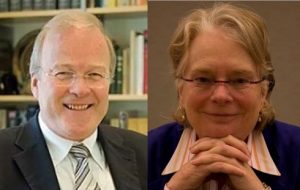
Video available HERE
Overall, this series of salons was intended to include as diverse a range of voices as possible. We sought to bring together both relatively new scholars and well established people, Francophone and Anglophone scholars, and those from various parts of the world (including France, the United States, the UK, Australia, the Netherlands, Germany, and Italy.) There are many other people whose voices could—and should—have been part of this; we very much hope that this will spark continued conversations and exchanges!
Jennifer Heuer
University of Massachusetts-Amherst
Volume 11, Issue 15
“Natalie Zemon Davis: A Celebration of Her 90th Birthday”
Edited by:
Angela N. H. Creager, Princeton University
Francesca Trivellato, Institute for Advanced Study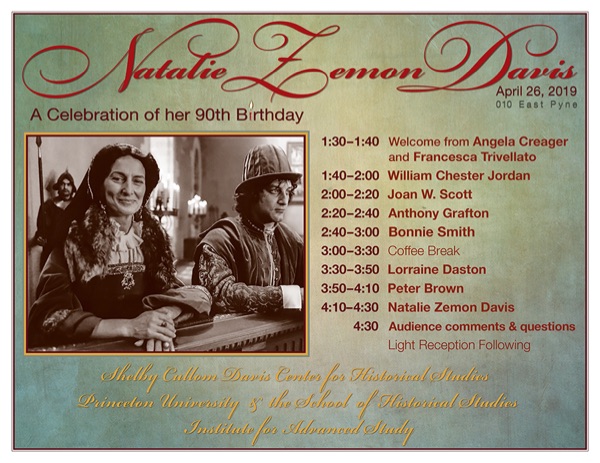 On April 26, 2019, Princeton University’s Shelby Cullom Davis Center for Historical Studies and the School of Historical Studies at the Institute for Advanced Study joined forces to celebrate the 90th birthday of Natalie Zemon Davis. Five former colleagues and friends paid tribute to Davis’s brilliant scholarship and intellectual leadership, then Davis herself regaled us with an account of her collaboration with the Lebanese-French-Québécois playwright and director Wajdi Mouawad, which brought an adaptation of her book Trickster Travels: A Sixteenth-Century Muslim Between Worlds to the stage. It was a dazzling event in a packed auditorium. We are delighted that the speakers, themselves illustrious historians, agreed to have their texts published on H-France Salon.
On April 26, 2019, Princeton University’s Shelby Cullom Davis Center for Historical Studies and the School of Historical Studies at the Institute for Advanced Study joined forces to celebrate the 90th birthday of Natalie Zemon Davis. Five former colleagues and friends paid tribute to Davis’s brilliant scholarship and intellectual leadership, then Davis herself regaled us with an account of her collaboration with the Lebanese-French-Québécois playwright and director Wajdi Mouawad, which brought an adaptation of her book Trickster Travels: A Sixteenth-Century Muslim Between Worlds to the stage. It was a dazzling event in a packed auditorium. We are delighted that the speakers, themselves illustrious historians, agreed to have their texts published on H-France Salon.
“Introduction”
Angela N. H Creager (Princeton University) and Francesca Trivellato (Institute for Advanced Study)
“A Microhistory of an Unnamed French Girl, 1267”
William Chester Jordan
Princeton University
“Natalie Zemon Davis, Historian of Hope”
Joan Wallach Scott
Institute for Advanced Study
“A Present for Natalie”
Anthony T. Grafton
Princeton University
“Natalie Zemon Davis Solves a Problem”
Bonnie G. Smith
Rutgers, The State University of New Jersey
“Classic Natalie”
Lorraine Daston
Max Planck Institute for the History of Science/University of Chicago
“Listening with Natalie, 1975”
Peter Brown
Princeton University
“Doing History at 90”
Natalie Zemon Davis
Princeton University
Volume 11, Issue 14
“Legitimizing ‘iel’? Language and Trans Communities in Francophone and Anglophone Spaces”
Edited by:
Vinay Swamy, Vassar College
Louisa Mackenzie, University of Washington, Seattle
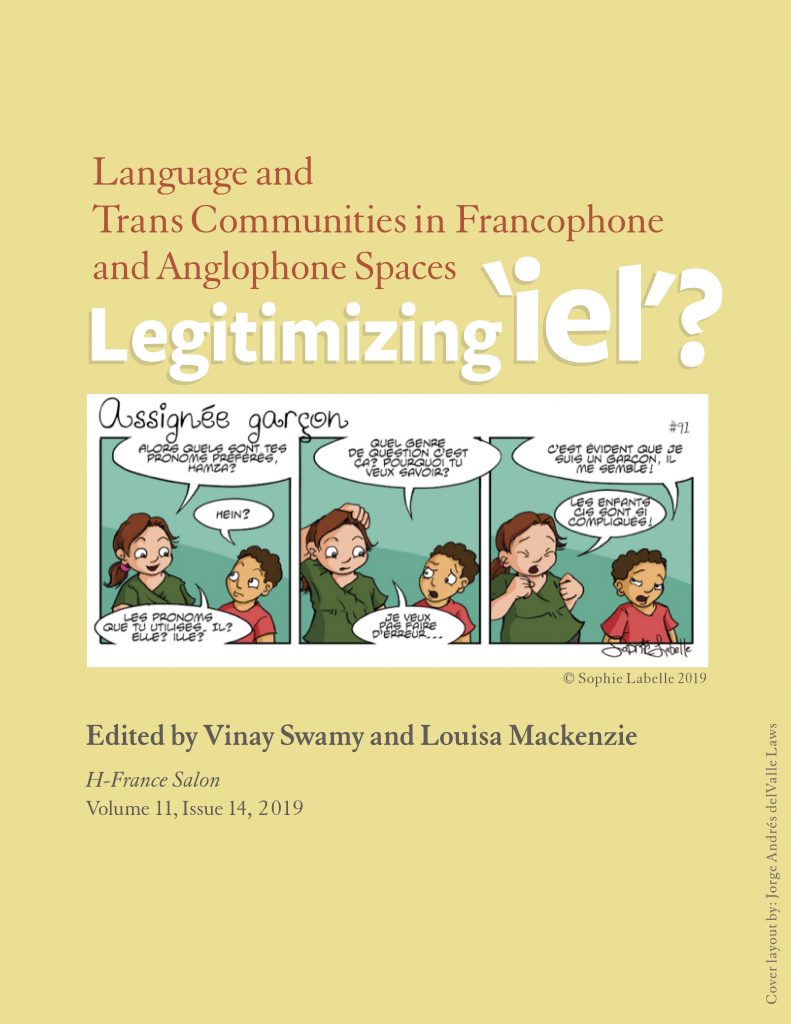 The last few years have seen an increased visibility of non-binary persons who are publicly claiming their identities and pronouns beyond the gender binary in both English and French. While the singular “they” has gained favor among many in Anglophone spaces due in part to the precedent for such a usage in English, Francophone non-binary persons have had to face further challenges regarding language and syntax given the binary nature of French grammar itself. This special issue considers recent attempts to make available gender‑equitable, ‑neutral, and ‑expansive language and identities to French speakers within linguistic, cultural, and pedagogical spaces. In offering to the readers of H-France our reflections on these developments, the contributors to this special issue expand on the fruitful exchange initiated at a symposium at Vassar College in April 2018—when earlier versions of this material were first presented—and invite dialogue with a broader public. In so doing, we hope that the questions we raise will be taken in the spirit of ongoing inquiry rather than as prescriptive positions (as indicated by the titular question mark), and that our chapters will be read as open-ended engagements with the rapidly-developing public conversations on non-binary issues beyond the academy. We also hope that the embedded hyperlinks and the appended glossary will allow our readers to engage directly, if they so wish, with the many multimedial resources cited in this issue.
The last few years have seen an increased visibility of non-binary persons who are publicly claiming their identities and pronouns beyond the gender binary in both English and French. While the singular “they” has gained favor among many in Anglophone spaces due in part to the precedent for such a usage in English, Francophone non-binary persons have had to face further challenges regarding language and syntax given the binary nature of French grammar itself. This special issue considers recent attempts to make available gender‑equitable, ‑neutral, and ‑expansive language and identities to French speakers within linguistic, cultural, and pedagogical spaces. In offering to the readers of H-France our reflections on these developments, the contributors to this special issue expand on the fruitful exchange initiated at a symposium at Vassar College in April 2018—when earlier versions of this material were first presented—and invite dialogue with a broader public. In so doing, we hope that the questions we raise will be taken in the spirit of ongoing inquiry rather than as prescriptive positions (as indicated by the titular question mark), and that our chapters will be read as open-ended engagements with the rapidly-developing public conversations on non-binary issues beyond the academy. We also hope that the embedded hyperlinks and the appended glossary will allow our readers to engage directly, if they so wish, with the many multimedial resources cited in this issue.
“Introduction”
Vinay Swamy (Vassar College) and Louisa Mackenzie (University of Washington, Seattle)
I. Histories
“« Le masculin l’emporte » : évolution des stratégies linguistiques dans les associations LGBT+ en France”
Flora Bolter
Fondation Jean Jaurès
“Linguistic Uprisings: Toward a Grammar of Emancipation”
Luca Greco
Université de Metz
II. Pedagogies
“‘Faut-il choisir ?’: Transgender Access to the French Language Classroom”
Blase A. Provitola
Columbia University
“Les personnes non-binaires en français : une perspective concernée et militante”
Florence Ashley
McGill University
III. Art, Activism, Academia
“Transnational Reflections on Embodying Non-binary Pronouns”
Logan Natalie O’Laughlin
Duke University
“Beyond ‘French-American’ Binary Thinking on Non-Binary Gender”
Louisa Mackenzie
University of Washington, Seattle
“Assignée garçon or Grappling with the Trans Question in the French Language”
Vinay Swamy
Vassar College
Volume 11, Issue 3
“État, pouvoirs et contestations dans les monarchies française et britannique et dans leurs colonies américaines (vers 1640-vers 1780)”
Edited by:
Stéphane Jettot, Université Paris Sorbonne
Vincent Meyzie, Université Paris Nanterre
Cette bibliographie a été initialement rédigée pour aider les candidats passant en France les concours de recrutement de l’enseignement secondaire à préparer les examens (Capes d’histoire-géographie et agrégation d’histoire) en leur fournissant un état à jour de la production historienne sur la question au programme sur État, pouvoirs et contestations dans les monarchies française et britannique et dans leurs colonies américaines (vers 1640-vers 1780). Plaçant au cœur du sujet l’étude des conceptions, de l’exercice et des contestations de l’autorité politique, celle-ci structure donc la bibliographie proposée (ce qui explique la part sciemment modeste de travaux relevant de l’histoire atlantique et de l’histoire impériale). Logiques pédagogiques et logiques scientifiques se sont donc conjuguées pour présider à la réalisation d’un instrument bibliographique à la fois sélectif, analytique et actualisé.
Il nous semble utile de mettre largement cette bibliographie à disposition de la communauté historienne, notamment dans le but d’une meilleure circulation transatlantique entre historiographies de langue française et de langue anglaise. En effet, par son ampleur et par la mise en exergue d’une multiplicité de thématiques, elle rend visible la variété des sujets abordés par l’histoire politique au sens large. Elle permet peut-être aussi d’entrevoir, en creux, les fronts pionniers et les angles morts de la recherche.
Bibliographie (Achevée et arrêtée fin août 2018)
Volume 11, Issue 2
“Race, Racism, and the Study of France and the Francophone World Today”
Edited by:
Emily Marker, Rutgers University -Camden
Christy Pichichero, George Mason University
This special three-part series of H-France Salon seeks to create a space for the H-France community and beyond to critically re-evaluate how we address race and racism in our scholarship and research agendas, in our pedagogical practice, and in our professional institutions. As the struggle for racial justice in the academy and society at large in both France and the US has simultaneously been reinvigorated and come under increasing attack in recent years, we have found that many of our colleagues who have not focused on race and racism in the past are eager to engage with these issues now and are seeking tools, resources, and cutting-edge research. To that end, at the 2017 annual meeting of the Western Society for French History, Dr. Christy Pichichero organized a plenary roundtable on structural racism (the videorecording is available here), and Dr. Emily Marker facilitated an accompanying workshop on combating structural racism in the classroom. Based on the significant response to that programming, H-France approached us to continue and expand those initial conversations as guest editors of an H-France Salon.
The Salon is organized in three issues – one each primarily devoted to research, institutional and professional matters, and pedagogy – with the aim of encouraging our community of scholars to consider the significance of race and racism across all of these aspects of our everyday practice as academics. For the first installment, we asked a group of scholars to write short reflections on the state of their fields and to respond to one another’s thoughts in an online “conversation.” The contributors to this issue of the Salon are Dorian Bell, Madeleine Dobie, Éric Fassin, Abdellali Hajjat, T. Denean Sharpley-Whiting, Michael G. Vann, and Françoise Vergès. We urge you to share these exchanges widely with interested colleagues, students, and administrators, and we hope that you will continue to follow the discussion in the issues to come.
“Introduction”
Emily Marker (Rutgers University-Camden) and Christy Pichichero (George Mason University)
“Race within French Academia”
Éric Fassin
Université Paris-8
“Race and Racism: The Afterlives of Slavery and Colonialism”
T. Denean Sharpley-Whiting
Vanderbilt University
“Obstacles et avancées de la recherche sur la question raciale en France”
Abdellali Hajjat
Paris-Nanterre
“Beyond the New Anti-Semitism”
Dorian Bell
University of California, Santa Cruz
“Toutes les féministes ne sont pas blanches : Pour un féminisme décolonial et de marronnage”
Françoise Vergès
Collège d’études mondiales, FMSH-Paris
“Will French History Finally Engage Intersectionality?”
Michael G. Vann
Sacramento State University
“Updating & Globalizing Francophone Studies”
Madeleine Dobie
Columbia University
Dorian Bell, University of California, Santa Cruz
Madeleine Dobie, Columbia University
Éric Fassin, Université Paris-8
T. Denean Sharpley-Whiting, Vanderbilt University
Michael G. Vann, Sacramento State University
Françoise Vergès, Collège d’études mondiales, FMSH-Paris
Volume 11, Issue 1
“Becoming Revolutionaries: Papers in Honor of Timothy Tackett”
Edited by:
Micah Alpaugh, University of Central Missouri
Robert Blackman, Hampden-Sydney College
Ian Coller, University of California-Irvine
The essays in this issue, offered not only by Tackett’s contemporaries but also by former students and emerging scholars, give a rich picture of his legacy and the continuing impact of his ongoing work. If he has shaped our historical practice, it has been above all by bringing human choice back to the center in a way that preserves the structural insights of the work that preceded him. He has never located himself in any “school” or sought to build one, as the diversity of these papers reveals. Drawing on the best of the Annales approach, he has consistently emphasized the need to place the choices of individuals in a larger social context. Like the great proponents of the “classical” interpretation, he has been finely attuned to regional particularities, and the responses “from below” as well as those of elites. Responding to the linguistic and cultural “turn,” he has paid close attention to the ways in which people represent their experience, uncovering a wealth of largely neglected sources. Yet at the heart of Tackett’s work is the question—not so much “why,” but how historical actors make choices that in their aggregate make revolutions, civil wars, social advances and episodes of violence.
“Becoming Timothy Tackett: An Appreciation”
Ian Coller
University of California-Irvine
“Roundtable: Tim Tackett as a Mentor”
Micah Alpaugh, University of Central Missouri
Robert Blackman, Hampden-Sydney College
Elizabeth Bond, Ohio State University
Patricia Goldsworthy-Bishop, Western Oregon University
Kate Marsden, Wofford College
Glen Porter-Pineda, Independent Scholar
Laura Sextro, University of Dayton
Part I: The Coming of the Revolution
“Becoming Revolutionaries in the Streets of Paris”
David Garrioch
Monash University
“Issues of Slavery and the Slave Trade in the Politics of the Early French Revolution”
Alan Forrest
University of York
“The Beginning of the Interregnum: The Origins of the Fusion of the Orders, 27 June 1789”
D.M.G. Sutherland
University of Maryland
“Paper Solutions for Real Problems: Solving Problems of Public Order Through Constitutional Revision in the National Assembly, Summer-Fall 1789”
Robert H. Blackman
Hamden-Sydney College
“Politics Lost: Civic Emotions and Political Institutions in the Early French Revolution”
Adrian O’Connor
University of South Florida — St. Petersburg,
“Devious Priests and Wayward Wives: Combatting Rural Resistance to the Constitutional Church”
Angela Haas
Missouri Western State University
“Deputies and Journalists in the French Revolution”
Jeremy D. Popkin
University of Kentucky
Part II: The Coming of the Terror
“Réflexions autour de ‘la Terreur’”
Michel Biard
Université de Rouen
“Choosing Sides in Revolutionary Times: The Diarists of Orléans”
Peter McPhee
University of Melbourne
“The Power of Emotions: New Light on the Conventionnels and the Process of the Terror”
Marisa Linton
Kingston University
“Provostial Justice and the Hors la loi Decree of March 19, 1793”
Ted W. Margadant
University of California-Davis
“‘Robbers, Muddlers, Bastards and Bankrupts?’: A Collective Look at the Thermidorians”
Mette Harder
SUNY Oneonta
“Itineraries, Historical and Political”
Timothy Tackett
University of California, Irvine
Volume 10, Issue 11
The Tallahassee Report and Graduate Training in French History
April 13-14, 2018
On April 13 and 14, 2018, approximately 35 doctoral students and their faculty advisors working on Old Regime, Enlightenment, and Revolutionary French history met at Florida State University to examine how doctoral education in this broad field has changed in the U.S. in recent years and to identify ways teaching, research, and the job search might be reconfigured in light of these changes. Together they represented 20 of the American universities currently granting doctoral degrees in this area of French history; observers from France and the UK were also present. The Tallahassee Report is the result of that meeting. In it the group identifies key challenges and puts forward some suggestions for how to address them. Over the summer the report was shared with several historians who did not participate in the meeting and represent a range of generations, institutions, and perspectives. Their responses are presented here along with the report with the aim of initiating a conversation on these important issues among the H-France community at large. We welcome your comments.
#2 Some Reflections on De-specialization at a Small Graduate Program
Junko Takeda
Syracuse University
#3 Recommendations from the Teaching Trenches: Supporting Graduate Students and Junior Scholars in Old Regime, Enlightenment, and Revolutionary French Studies
Laura Talamante
California State University, Dominguez Hills
#4 On the Tallahassee Report
Julia M. Gossard
Utah State University
#5 Plus ça change
Lynn Hunt
UCLA
#6 On the Tallahassee Report:
Is It Time for Re-Specialization?
J.P. Daughton
Stanford University
#7 Enjamber l’Atlantique. Réflexions sur le Tallahassee Report
François-Joseph Ruggiu
Sorbonne Université & CNRS
Volume 10, Issue 1
“Le Cas ’68”
As part of its recognition of the 50th anniversary of May ’68, H-France Salon has teamed up with students in Chris Reynolds’ course on May ’68 at Nottingham Trent University to produce a historical blog of those dramatic months. These blog entries address many of the key events and people that marked the spring of 1968 and provide both descriptions of various issues and people and links to more detailed information. The blog begins on March 22 and then picks up again on May 3, charting pivotal moments of these seminal events. Twelve blog entries were published during these months. We encourage you to share these blogs with your students and with anyone interested in learning more about Le Cas ’68 in France.
Home – May 68
March 22
May 3
May 10
May 13
May 14
May 24
May 27
May 29
May 30
June 10
June 14
June 23
Special thanks to Dr. Agathe Zobenbuller for all her work in supporting the students on this project.
Volume 9, Issue 18
“In Honor and Memory of Rachel Ginnis Fuchs: Scholar, Teacher, Colleague, Mentor, and Friend”
Edited by Jean Elisabeth Pedersen, University of Rochester
The salon begins with a brief introduction:
Jean Elisabeth Pedersen, University of Rochester, “Introduction“
The salon continues with a memorial roundtable held at the 63rd Annual Meeting of the Society for French Historical Studies, Washington, DC, April 22, 2017
“Colleague, Scholar, Mentor, and Friend: A Memorial Roundtable Honoring the Life and Work of Rachel Ginnis Fuchs,”
Organizer: Cheryl Koos, California State University, Los Angeles
Chair: Elinor A. Accampo, University of Southern California
Participants:
Linda Clark, Millersville University of Pennsylvania
Venita Datta, Wellesley College
Victoria Thompson, Arizona State University
Richard Hopkins, Widener University
Joelle Neulander, The Citadel
Katie Jarvis, University of Notre Dame
Video available HERE
The salon continues with six essays:
Christiane Demeulenaere-Douyère, Conservateur général du patrimoine (h), Paris, “Une histoire d’enfants trouvés“
Sylvia Schafer, University of Connecticut, “On Rereading Abandoned Children: Foundlings and Child Welfare in Nineteenth-Century France“
Leslie Page Moch, Michigan State University, “More to Offer: Rachel Fuchs and Poor and Pregnant in Paris“
Mary Lynn Stewart, Simon Fraser University, and Elinor Accampo, University of Southern California, “Producing Gender and the Politics of Social Reform with Rachel Fuchs: A Model for Co-Authorship, Collaboration, and Friendship“
Robert A. Nye, Oregon State University, “Gendering Family History in Modern France: An Assessment of Rachel G. Fuchs’s Scholarly Contributions“
Anne R. Epstein, Independent Scholar, “Remembering Rachel Fuchs: Transnational mentor and co-editor par excellence“
Volume 9, Issue 17
“Experiencing May ’68 in France”
Edited by Chris Reynolds, Nottingham Trent University
Assistant Editor: David Kammerling Smith, Eastern Illinois University
A Salon in 40 parts
As the 50th anniversary of May-June 1968 approaches, one can safely predict a continuation in the now traditional outpouring of interest that has been so important in helping shape the French collective memory of these seminal events. The anticipated commemorative surge will underscore the ongoing and durable legacy of “mai 68” as a watershed moment in the political, social, and cultural development of France as well as highlighting just how much debate remains over how 1968 should be understood and remembered. Central to shaping this narrative will be the experiences of those who were present at the time and whose stories of their diverse experiences go a long way to helping make sense of why 1968 remains such a focus of fascination 50 years later.
H-France has been developing several issues of H-France Salon on those events as its contribution to the decennial commemoration. We are delighted to share the first of these with you today.
Between Fall 2016 and Spring 2017, Chris Reynolds interviewed 22 academics from the United States, Canada, the United Kingdom, the Netherlands, and France who experienced May-June 1968 in France. We present these interviews to you in two formats.
First, we have created 18 thematic videos focused on important themes in debates around the events of 1968. We hope that many of you might find these thematic videos useful for teaching modules or seminars on 1968.
Second, the full interviews with individual scholars are available as these might be of particular interest to scholars researching May 1968 and to those studying its continuing memory.
Thematic Videos:
- Why in France?
- Surprised?
- How Involved?
- A Foreigner in France?
- Students and Workers
- La Prise de Parole
- Violence
- Nationwide
- International Zeitgeist
- The Political Elites
- Relief or Disappointment?
- Back Home?
- Consequences for France
- Understanding of France?
- Effects, Personal and Political
- Effect on Scholarship
- The Dominant Interpretation
- Summary
Individual Videos:
- Carolyn A. Durham, The College of Wooster
- Eric Freedman, Benjamin Cardozo Law School
- William Kidd, University of Stirling
- Alain Viala, Lady Margaret Hall, University of Oxford
- Rosemary Lloyd, Indiana University
- Timothy Tackett, University of California, Irvine
- Marie-Elisabeth Deroches-Miles, Université de Reims Champagne-Ardenne
- Jim Freedman, Western University
- Andrew Feenberg, Simon Fraser University
- Bernard Roussel, l’École Practique des Hautes Études
- Dennis Wood, University of Birmingham
- John Hurt, University of Delaware
- Gillian Thompson, University of New Brunswick
- Donald Sutherland, University of Maryland
- Yves Montenay, Président de l’Institut Culture Economie et Géopolitique
- Mike Kelly, University of Southampton
- Paul Werner, Ph.D., DSFS, Editor WOID and Publisher, The Orange Press
- Mary Anne O’Neil, Whitman College
- Willem Frijhoff, Université Érasme de Rotterdam
- John Molyneux, Editor, Irish Marxist Review
- Martin Staum, University of Calgary
- Eileen Tilly, Bangor University
Volume 9, Issue 15
“In Memoriam: William Humphrey Beik, 1941-2017”
David Parker, University of Leeds
Volume 9, Issue 14
“The Social History of Impressionism”
Alexis Clark, Washington University in St. Louis, and David Peters Corbett, The Courtauld Institute of Art, “Introduction to ‘Questionnaire on Impressionism and the Social History of Art’”
“Responses to ‘Questionnaire on Impressionism and the Social History of Art’”
Emily C. Burns, Auburn University, “‘Local Color’: Social Art History, Global Impressionism, and Comparative Interpretation”
Hollis Clayson, Northwestern University, “Impressionism: A Procrustean Bed?”
Frances Fowle, University of Edinburgh, “Peripheral Impressionisms”
Anna Gruetzner Robins, University of Reading, “Impressionist Futures”
Laura Anne Kalba, Smith College, “Is Impressionism History?”
Richard Kendall, Independent curator and art historian, “The Positive and the Negative”
Morna O’Neill, Wake Forest University, “Moving Beyond ‘Post T. J. Clark Ad-Hocism’”
Samuel Raybone, Courtauld Institute of Art, “‘A millionaire who paints in his spare time’. The social history of art and the multiple rediscoveries of Gustave Caillebotte”
Harmon Siegel, Harvard University, “Social Art History, A Thing of the Past?”
Marnin Young, Yeshiva University, “On the Limits of Context”
Alexis Clark, Washington University in St. Louis, “Teaching the Social History of Art”
Video Discussion: “The Social History of Impressionism: A Conversation”
Moderator: Alexis Clark
Participants:
Frances Fowler, University of Edinburgh
Marnin Young, Yeshiva University
Volume 9, Issue 12
“In Memoriam: Roger L. Williams, 1923-2017”
John F. Freeman, Laramie, Wyoming
Volume 8, Issue 12
“The Institut d’Histoire de la Révolution Française: Changing Time”
Edited by Stephen Sawyer, American University of Paris
The Institut d’Histoire de la Révolution Française (IHRF) is an organization that has long played a central role welcoming Anglophone scholars into the French academic world. The IHRF, however, currently is undergoing significant institutional changes. H-France has taken this moment in the IHRF’s history to prepare a salon, edited by Stephen Sawyer, in which four scholars reflect upon their experiences with the IHRF. While there are many conflicting views on the changes the IHRF faces, we hope these pieces will highlight the important role the IHRF has served as an academic and intellectual center.
The salon begins with a brief introduction:
Stephen Sawyer, American University of Paris, “‘My IHRF’: Thoughts from Across the Pond”
The salon then continues with four essays:
Jeremy Popkin, University of Kentucky, “The Institut d’Histoire de la Révolution Française in World-Historical Perspective”
Jennifer Ngaire Heuer, University of Massachusetts Amherst, “My IHRF: From the Bicentennaire to the 21st Century”
David A. Bell, Princeton University, “My IHRF”
Timothy Tackett, University of California, Irvine, “L’Institut d’Histoire de la Révolution Française”
Volume 8, Issue 1
“David Bien: In Memoriam”
Gail Bossenga, Elizabethtown College
Volume 7, Issue 20
“The Scholary Critique”
H-France Practices and Standards
David Kammerling Smith, H-France Editor-in-Chief, Eastern Illinois University, “H-France Review: Policies, Procedures, and a Bit of History”
The Scholarly Critique: Some Historical Perspective
Ann Blair, Harvard University, “Scholarly Critique in Early Modern Europe”
John L. Harvey, St. Cloud State University, “The Lamentations of Jameson and Clio’s ‘Critical Eye’”
Michael Christofferson, Adelphi University, “Scholarly Critique in the Twenty-First Century”
The Scholarly Critique: Personal Experiences
Catherine Nesci, University of California, Santa Barbara, “A Personal Perspective on Book Reviewing”
G. Matthew Adkins, Columbus State Community College, “Fear and Loathing at the H-France Review Publication Desk: Nausée and the Hostile Review”
Reviewing Across Boundaries
Daniel Brewer, University of Minnesota, “The Bounds of Critique, Critique out of Bounds”
Annie Jourdan, Université d’Amsterdam, “Un métier, mais des pratiques différentes”
Colin Jones, Queen Mary College, University of London, “Cat Massacres, the Jones Conundrum, and Peer Review”
Tom McDonough, Binghamton University, “Scholarly Critique between Institution and Interpretation”
The Scholarly Critique: Reflections on Practices and Ethics
Nancy Green, École des Hautes Études en Sciences Sociales, “‘How violently the hands of even very senior figures shook’: Peer Review between Encomium and Invective”
Maurice Samuels, Yale University, “Reviewing Across Disciplines”
Dominique Kalifa, Université Panthéon – Sorbonne /Institut Universitaire de France, “Le compte rendu, une « police scientifique » ?”
David Bell, Princeton University, “In Defense of Criticism”
Margaret Atack, University of Leeds, “Criticism and Critique: A View from French Studies”
The Scholarly Critique: Editors’ Perspectives, a conversation
A conversation between:
Michael Wolfe, H-France Review Chief Review Editor, Queen’s College, CUNY
Penny Roberts, French History, Co-Editor, University of Warwick
Robert Schneider, American Historical Review, Former Editor, Indiana University
Video available HERE
Volume 7, Issue 15
“Donald A. Bailey, 1940-2015“
Robert Young, University of Winnipeg
Volume 7, Issue 14
“The Robespierre Problem”
Edited by Peter McPhee, University of Melbourne
Peter McPhee, University of Melbourne, “The Robespierre Problem: An Introduction”
David Andress, University of Portsmouth, “The Robespierre Problem”
Marisa Linton, Kingston University, “The Choices of Maximilien Robespierre”
Michel Biard, GRHis, Normandie Université, Rouen, “Robespierre pris au piège des mécanismes d’épuration politique”
Hervé Leuwers, Université Lille 3 – UMR IRHiS, “Aux origines du « problème » Robespierre: l’historien face à ses interrogations”
Colin Jones, Queen Mary, University of London and Peter McPhee, University of Melbourne, “The Robespierre Problem: A Conversation”
Volume 7, Issue 13
“New Directions: French Scholarship on Early Modern France”
Edited by Hilary Bernstein, University of California, Santa Barbara
Hilary Bernstein, University of California, Santa Barbara, “Introduction”
Conference Presentations at the 60th Annual Meeting of the Society for French Historical Studies, Montreal, QC, April 25, 2014
Hugues Daussy, “Écrire une Histoire Politique de la Reforme française”
Claire Chatelain, “Positions and Roles dans la Parente”
Elie Haddad, “Une histoire sociale de la noblesse française”
Commentary by audience
Anglophone Written Commentaries
James C. Collins, Georgetown University, “Calm waters”
Penny Roberts, University of Warwick, “Family, self-expression and defense of the faith”
Jonathan Dewald, University at Buffalo, State University of New York, “Microclimates”
Michael P. Breen, Reed College, “Concluding Remarks”
Volume 7, Issue 12
“Stanley Hoffman, 1928-2015”
Mary Dewhurst Lewis, Harvard University
Volume 7, Issue 4
“Thing of the Day”
Presented by Leora Auslander, University of Chicago
The use of material culture as evidence has a long and honorable history among scholars of France. The last two decades has, however, seen a resurgence of interest in its possibilities. Inspired by this renewed interest, the Society for French Historical Studies conference at Colorado College in April 2015 featured a plenary session entitled “Teaching from Objects.” Envisaging a workshop format, we invited participants to bring an object that had given them insight into a problem or question in French history that they had used successfully in the classroom or an object that intrigued them but that they could not figure out how to interpret or teach. The session was very well-attended and discussion so lively that we could barely begin to talk about the objects people had brought.
We will be having a follow-up workshop at the Western Society for French History Meetings in Chicago in November and hope that, along with many new participants, those who came to the first will join in this one. (We promise to be better organized so that more things can be discussed!)
Looking forward to that session, and building on the workshop in Colorado, we have put out a call for a “Thing of the Day” post, which will be presented as part of H-France Salon. Each “Thing of the Day” post will include images and a description of a “Thing” and a discussion blog so that individuals can join a conversation about the “Thing.”
#1 Pierre le Négre Playing Cards
Volume 7, Issue 3
“Peter Gay, A Remembrance”
David Avrom Bell, Princeton University
Volume 7, Issue 2
“Considering Thomas Piketty’s Capital in the Twenty-First Century”
Edited by Kenneth Mouré, University of Alberta
Kenneth Mouré, University of Alberta, “Introduction”
Philip Hoffman, California Institute of Technology, “Historians should pay much more attention to what people do and perhaps pay a little less to what they say or think”
Richard Kuisel, Georgetown University, “What can Capital in the Twenty-First Century teach French historians? Beaucoup”
Patrice Baubeau, Université Paris Ouest Nanterre La Défense, IDHES, “History really enters the picture”
Mary O. Furner, University of California at Santa Barbara, “A major contribution to public philosophy”
Kenneth Mouré, University of Alberta, “Interview of Thomas Piketty”
Volume 6, Issue 10
“The Eighteenth Century According to Jeffrey Merrick”
Victoria Thompson, Arizona State University, “Introduction”
Bryant T. Ragan, The Colorado College, “Same-Sex Sexuality according to Jeffrey Merrick”
Suzanne Desan, University of Wisconsin-Madison, “The Family in the Old Regime, According to Jeffrey Merrick”
Mita Choudhury, Vassar College, “Jeffrey Merrick and Political Culture”
Victoria Thompson, Arizona State University, “Interview with Jeffrey Merrick”
Volume 4, Issue 1
“Resistance and Order in Early Modern France”
Michael Breen, Reed College, “Introduction.”
James Collins, Georgetown University, “Resistance and Order in Early Modern France.”




